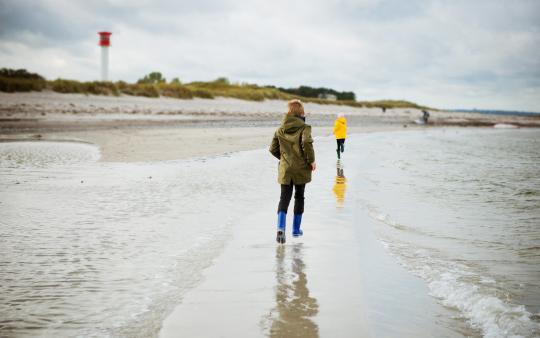As I write this, the last rays of sunlight slip behind the Olympic Mountains, casting streaks of bronze and violet across the clouds. Dusk settles over Puget Sound, and far-off shipping boats begin to fade. Great blue herons return from the day’s fishing, sailing over the marshlands and cow pastures to their rookeries. No matter the time of year, the seaside invites visitors: a boy hunts for crabs beneath barnacle-covered rocks, an older couple reclines on a park bench, a golden retriever shakes out its coat. The ocean draws us all here. With the stress swirling around from the global Covid-19 pandemic, time spent in nature provides welcome solace and renewal. Turns out, science backs up the healing power of the sea.
A THETA STATE OF MIND
The book Blue Mind, by marine biologist Wallace J. Nichols, highlights the clear, objective health benefits of spending time on, or even just near, the water. While working as a biologist, Dr. Nichols grew increasingly interested in the ocean’s effects on physical and mental health after observing improved quality of life for people who live in coastal zones. Combining neuroscience, biology, and history, Nichols presents a compelling case that the ocean can shift our brain chemistry, hormone balance, and nervous system to promote wellbeing. He calls this shift, “blue mind.” Simply put, being close to the ocean engages our relaxation response, decreases stress hormone activity, and leaves us feeling refreshed.1
Research shows that being near the ocean decreases the stress hormones cortisol, epinephrine, and norepinephrine, promoting a relaxed state. Our brain begins to slow into theta waves, measuring around 4–8 Hz, as the adrenal glands taper down stress hormone output. Theta waves are created when the mind is in a state of relaxed flow, such as during meditation or drifting to sleep. These waves are often themselves described as a gentle ocean current. Just listening to a recording of ocean waves crashing is a meditative technique for shifting the mind to a theta state. When the brain generates theta waves, a remarkable physiological response follows.2
A theta state activates the growth of new neurons and brain connections and encourages parasympathetic tone. The hippocampus is activated for long-term memory storage, and parts of the brain connected to day-dreaming and creative thinking awaken.3 We tamp down the amygdala-based fear response, allowing intuition to guide our thoughts. In this way, time near the ocean gives our brain a chance to heal, expand, and develop. We relax the fight-or-flight instinct that is often over-engaged for many of us, particularly now. One way the ocean has this effect is through negative ions (ions that have gained a negative electrical charge). Negative ions are abundant in nature, and are particularly concentrated near the ocean, and they have a number of positive health effects, including purifying the air, decreasing inflammation, and increasing serotonin levels in the brain. Serotonin is the target hormone for most anti-depressant medications, and promotes positive mood, motivation, and a sense of wellbeing. Time around the ocean is a science-based approach to helping children and teens heal from anxiety and depression, and gives parents a boost as well!
In The Red
Nichols contrasts the state of blue mind with what he coins “red mind,” referring to a stressed, fight-or-flight state. Children and teens are increasingly impacted by patterns of stress and anxiety as they navigate social pressures and face instability from the pandemic and global issues like climate change. Other lifestyle factors, like blue light from screens, and processed, inflammatory foods, push on stress hormone output. Over time, the brain becomes primed to shift into a sympathetic, stressed-out state. Research is clear that chronic distress blocks neural growth, impairs immune function, and interrupts the sleep cycle. Taking time out for mindful meditation, deep breathing, laughter, and creative activities are all great ways to shift out of red mind. As Nichols reveals, spending time by the sea is another highly effective strategy that can benefit every member of the family.
FROM GREEN TO BLUE
Public health experts are beginning to recognize the health benefits of the ocean. Preserving green spaces has long been common practice for municipalities for both environmental and community health.4 The health value of green spaces like parks and greenbelts to provide opportunities for recreation and relaxation amid busy urban environments is well established in the research literature and residents who live near them tend to lead healthier, happier lives. Similar research now examining residents near coastal regions finds that “blue spaces” also promote the health and wellbeing of the community with people living near the sea tending to live longer, with less burden of chronic disease.5 This remarkable finding not only holds true across a range of income levels but, in fact, notes that lower income residents living near blue spaces showed the most health benefit,6 with researchers hypothesizing that it may be due to more opportunities for recreation and physical activity.
Nichols’ work offers a deeper view: that the ocean has a profound effect on the inner workings of the mind and body, promoting calm, nervous system repair, and a sense of wellbeing. Taking an afternoon to visit the sea is time well spent, providing a wide variety of rest and recreation opportunities and an investment in the health of the whole family. This is another effective tool we can use to support children and teens struggling with mental health as part of a holistic treatment plan. Whether it’s learning to sail, kayaking, fishing, paddle-boarding, catching the surf, or just taking a picnic to a local marine park, carving out time in these places is worth the effort in ways you may not have imagined. Finally, understanding the healing power of the ocean is just one more reason to prioritize real solutions to human-caused climate change, for our children’s wellbeing and generations to come.
You may also enjoy: Why Children Need Nature for Future Well-Being, Using the Five Senses to Plug into Nature, and How to Teach Children to Care About the Environment.









